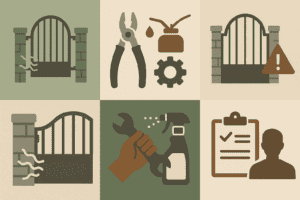Key Takeaways
- Identify common causes of gate noise to address issues promptly and effectively.
- Learn about simple maintenance tips to keep your gate operating smoothly.
- Understand when it’s time to consult a professional for gate repairs.
Table of Contents
- Understanding Gate Noise
- Common Causes of Gate Noise
- Simple Maintenance Tips
- When to Seek Professional Help
- Prevention and Regular Checks
Understanding Gate Noise
Hearing strange noises coming from your gate can be perplexing and annoying. Distinct sounds can range from creaks and grinds to loud clanks, each indicating a different issue. Understanding the cause of these noises is critical, as they often serve as early warning signs of underlying problems that could eventually lead to costly repairs or replacements if not addressed.

Whether used for residential, commercial, or industrial purposes, Gates undergo a lot of stress from constant use and exposure to the elements. Regular maintenance can prevent some of these noises, but knowing what each type of noise might signify is invaluable.
Common Causes of Gate Noise
Several factors can contribute to gate noise, sometimes necessitating gate repair. One of the most common causes is a lack of lubrication. When dry, metal components can scrape against each other, producing a grating sound. Lubrication is essential for hinges, rollers, and tracks to function smoothly; neglecting this can lead to increased wear and tear.
Another typical culprit is misalignment, often requiring gate repair. Over time, the gate’s alignment can shift due to ground settling or repeated impacts. A gate out of alignment can create a range of noises due to improper interaction between components. Misalignment often results in the gate dragging on the ground or jamming during operation.
Loose hardware is also a frequent source of noise. Vibrations from gate operation can loosen bolts and screws, leading to rattling sounds. Regularly checking for and tightening loose hardware can prevent these noises, contributing to the longevity and safe operation of the gate.
Simple Maintenance Tips
Routine maintenance is key to keeping your gate functioning quietly and effectively. Start by regularly inspecting your gate’s hardware. Tighten loose bolts and screws and replace any components that show significant wear. Next, apply a high-quality lubricant to all moving parts to minimize friction and noise.
Ensure that the gate is aligned correctly. You can often make minor adjustments; however, significant misalignments might require professional assistance. Keep the gate tracks clean and debris-free, as blockages can hinder smooth operation and cause grinding sounds.
Additionally, inspect the gate’s structure for any signs of rust or damage, which can contribute to noise and structural integrity issues. Addressing these areas promptly will help maintain the gate’s functionality and appearance.
When to Seek Professional Help
While many gate issues can be resolved with simple DIY methods, some problems require the expertise of a professional. If your gate continues to make noise after you’ve conducted essential maintenance, it may indicate a more serious issue. Structural damages, electrical problems in automated gates, and severe misalignments often demand skilled attention.
Consulting a gate repair professional ensures that issues are adequately addressed and can prevent potential safety hazards. If you notice excessive noise or difficulty in gate operation, seeking expert advice is wise to avoid further damage.
Prevention and Regular Checks
Preventative measures and routine checks are the best ways to ensure the longevity of your gate system. Establish a regular maintenance schedule for lubrication, alignment, and hardware inspections. Keeping a log of maintenance and repairs can help you identify patterns and predict when professional servicing might be necessary.
Additionally, pay attention to weather conditions, as extreme temperatures and moisture can affect metal components. Use weather-resistant materials and coatings to protect the gate, especially in areas prone to harsh weather.
Taking a proactive approach to gate maintenance will save you time and money and help you deal with the frustration of unexpected repairs. A well-maintained gate not only operates quietly but also enhances the security and aesthetics of your property.


